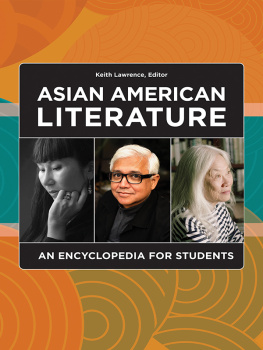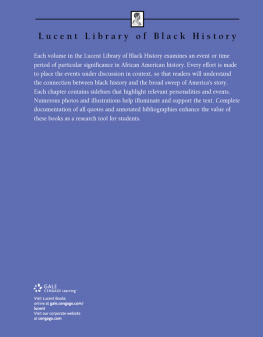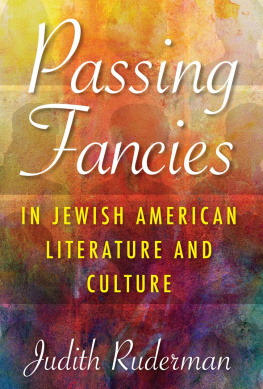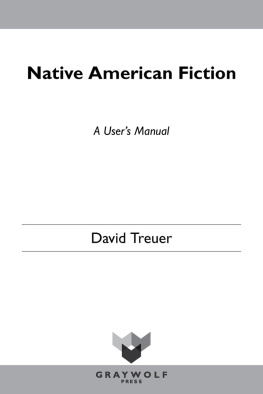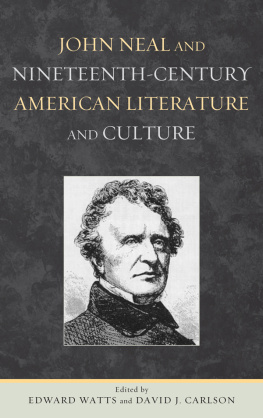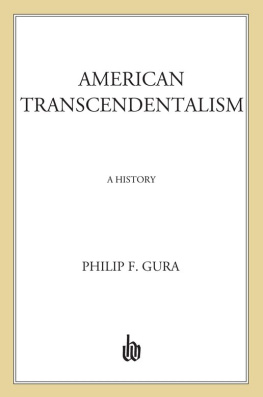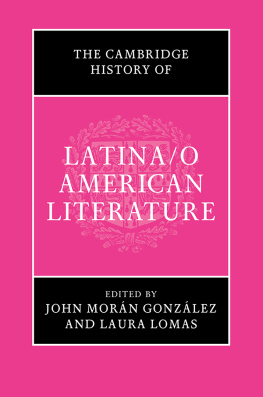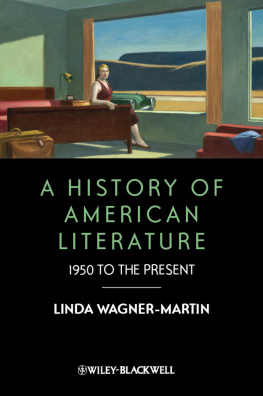Library of Congress
Cataloging-in-Publication Data
Gura, Philip F., 1950
The crossroads of American history and literature / Philip F. Gura.
p. cm.
Includes bibliographical references and index.
ISBN 0-271-01521-7 (cloth)
ISBN 0-271-01522-5 (paper)
1. American literature19th centuryHistory and criticism.
2. Literature and historyUnited StatesHistory.
3. American literatureColonial period, ca. 16001775History and criticism.
4. National characteristics, American, in literature.
5. United StatesIntellectual lifeHistoriography.
6. United StatesCivilizationHistoriography.
7. Historicism.
I. Title. PS217.H57G87 1995
810.9003dc20 520048
CIP
Copyright 1996
The Pennsylvania State University
All rights reserved
Printed in the United States of America
Published by
The Pennsylvania State University Press,
University Park, PA 168021003
It is the policy of The Pennsylvania State University Press to use acid-free paper for the first printing of all clothbound books. Publications on uncoated stock satisfy the minimum requirements of American National Standard for Information SciencesPermanence of Paper for Printed Library Materials, ANSI Z39.48-1992.
These essays were written at different times over the past two decades as part of my continuing investigations into colonial and antebellum history and literature. In most cases, they are not formally linked. I present them together primarily as evidence of methodology, for what they add up to is a statement concerning ways of asking and answering questions about American culture. Put another way, they represent the kind of empiricism necessary to work profitably in cultural studies. By placing them in such proximity, I hope that readers coming to them, whether for the first or second time, will be able to produce intellectual light and heat by striking them against each other.
Because these essays were composed over such a long period, many people have had a hand in their genesis, growth, and fruition. Foremost among those would be my teachers in college and graduate school, most notably Daniel Aaron, Bernard Bailyn, Warner Berthoff, Alan Heimert, Joel Porte, and (though still only graduate students) Barry OConnell and Richard Rabinowitz. In their different ways they helped me find the intellectual routes in which I would go. After them came departmental administrators, who urged me to continue in what then was viewed as a mavericks path. I think here particularly of Howard Munford at Middle-bury College, who continues to represent for me the very highest example of collegiality; Paul Levitt, James Kincaid, and Lesley Brill of the University of Colorado at Boulder, and Joseph Flora and Laurence Avery at the University of North Carolina at Chapel Hill. They never were bothered that they had a historian in their literature departments, and allowed me to cultivate my interests as I saw fit.
Colleagues at the institutions at which I have taught have been a constant resource: I mention in particular the Reverend Arnold McKinney and John Conron, both of whom were at Middlebury when I was there; L. Michael Bell, John Stevenson, and the late Keith Thomas at Colorado; and Everett Emerson, Richard Rust, Erika Lindemann, and Robert Bain at Chapel Hill. In the profession at large I am privileged to have learned from Lawrence Buell, David D. Hall, Joel Myerson, and Robert D. Richardson, Jr. The personal friendship of Donald F. Eaton, Richard J. Morey, Harry Crockett, and Glen Blalock also has been very important to me.
Fellowship support for this work came at different times from the University of Colorado, the Charles Warren Center at Harvard University, the National Endowment for the Humanities (for a fellowship at the Institute of Early American History and Culture), and the American Antiquarian Society. At these last two institutions, Thad Tate, James P. P. Horn, and Michael McGiffert (of the IEAHC) and John Hench (of the AAS) made me at home away from home and contributed immeasurably to an intellectual environment.
In the introduction to each essay I suggest in brief compass what was on my mind as I undertook the research that eventuated in the published piece, and I present the work virtually as it appeared, save for the correction of the inevitable typographical errors or infelicitous. phrasing, and the occasional addition of an explanatory note. I have resisted preparing a supplementary bibliography for each subject, but if significant work on it has appeared subsequent to my initial foray, I have so indicated in the prefatory material.
Finally, I thank Philip Winsor of Penn State Press for offering me the opportunity to present what I hope readers will find a fragrant, as well as a restorative, potpourri of work in American history and literature. And Leslie, for holding it all together, as usual.
Credits
, The Study of Colonial American Literature, 19661987: A Vade Mecum, first appeared in the William and Mary Quarterly, 3d ser., 45, no. 2 (April 1988): 30541, and appears with permission.
, Preparing the Way for Stoddard: Eleazer Mathers Serious Exhortation to Northampton, first appeared in the New England Quarterly 53, no. 2 (June 1984): 24050, and appears with permission.
, Cotton Mathers Life of Phips: A Vice with the Vizard of Vertue Upon It, was published in the New England Quarterly, 50, no. 3 (September 1977): 44057, and appears with permission.
, Solomon Stoddards Irreverent Way, was first published in Early American Literature 21, no. 1 (spring 1986): 2943. Permission granted by Early American Literature.
, Sowing for the Harvest: The Reverend William Williams and the Great Awakening, first appeared in the Journal of Presbyterian History 56, no. 4 (winter 1978): 32641, and is reprinted with permission of the Department of History, Presbyterian Church (U.S.A.), 425 Lombard Street, Philadelphia, Pennsylvania.
, Early Nineteenth-Century Printing in Rural Massachusetts: John Howe of Greenwich and Enfield, c. 18031845, was published in the Proceedings of the American Antiquarian Society 101, part 1 (spring 1991): 2552, and is reprinted by permission of the American Antiquarian Society.
, The Reverend Parsons Cooke and Ware Factory Village: A New Missionary Field, appeared in the New England Historical and Genealogical Register 135 (1981): 199212.
, The Transcendentalists and Language: The Unitarian Exegetical Background, first appeared in Studies in the American Renaissance 1979, ed. Joel Myerson (Boston: Twayne, 1979), 116.
, Elizabeth Palmer Peabody and the Philosophy of Language, first appeared in ESQ: A Journal of the American Renaissance 23 (1977): 15463, and is reprinted with permission.
, Manufacturing Guitars for the American Parlor: James Ashborns Wolcottville, Connecticut, Factory, 18511856, was published in the Proceedings of the American Antiquarian Society 104, part 1 (spring 1994): 11756, and is reprinted by permission of the American Antiquarian Society.
, Thoreau and John Josselyn, first appeared in the New England Quarterly 48, no. 4 (December 1975): 50518, and is published with permission.



